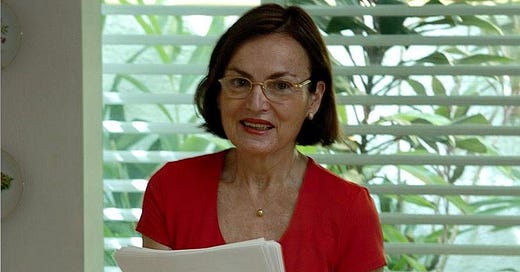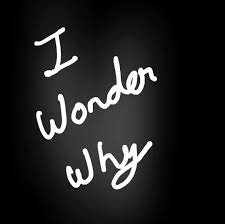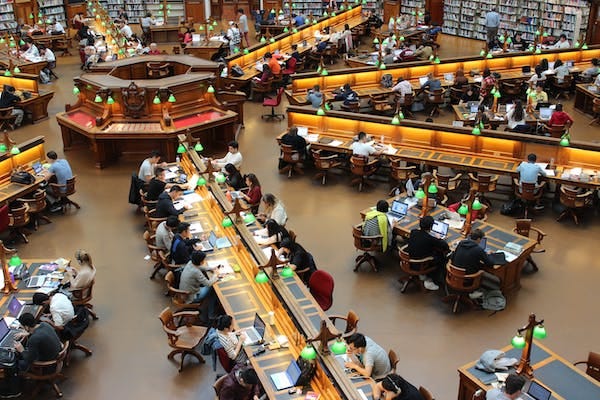Rosario Ferre: the Birth of Puerto Rican Literature
The importance of having the right agent & the right political leader
Much of the writing of Rosario Ferré (1938-2016) centers around two main themes: the history of Puerto Rico (a territory of the US), and the plight of women. One of Latin America's leading women authors, her work boldly brings Puerto Rico's history to life, sometimes employing surrealism, and often drawing upon true life stories from her own family history.
She often delves into the minds of troubled characters, particularly female characters harmed by courtship and matrimony with unworthy, unappreciative men. At times the abuse leads to bizarre fixations and strange diseases.
Although she had first published at age 13, she never took her writing seriously until her 30s when she studied with the Nobel Laureate of 2010, the Peruvian/Spanish writer Mario Vargas Llosa, 1st Marquess of Vargas Llosa, and With his encouragement, she started a literary journal dedicated to publishing new authors. (Scroll down to see my discussion with her.)
Ferré herself translated her own first book into English "Papeles de Pandora" (1976) under the title "Sweet Diamond Dust." Later, starting with the epic novel "Eccentric Neighborhoods" (1998) she began writing books in English. This is very rare and sets her apart from other Latin American writers.
The art of translation is a literary talent in itself; usually, languages are not similar enough to directly translate a literary work and must be recreated in order to capture the spirit of the work.
"House on the Lagoon" is a family saga that has been compared with the masterpieces of Gabriel García Márquez. "Flight of the Swan" (2001) is about a stranded Russian ballet company caught up in Puerto Rico’s independence movement.
Latin America's most prolific writer won a Guggenheim Fellowship a Puerto Rican Award and two German awards for works translated into German.Although I don't know for sure, it seems to me that Rosario Ferré would have fared much better with an agent who specialized in Spanish literature, like the late Carmen Balcells Segala, the Barcelona-based literary agent who represented all the most famous Spanish & Latin American writers. Perhaps for logistical reasons of business simply being easier to conduct domestically, she had a New York City agent instead and really did not get the credit she deserved during her lifetime. Rosario Ferré was born into one of Puerto Rico's wealthiest families. Her father, Luis Ferré, was the island's third governor and perhaps its most admired leader along with its first governor Luis Muñoz Marin who graduated from Harvard University and solved the crisis of PR's status, making it a commonwealth. After three terms in office, Muñoz Marin stepped down fearing that his own party was becoming too powerful, undermining democracy. Ferré, too, put the island ahead of his own personal interests, as is expected of ALL real leaders. An MIT graduate, he was an industrialist and active philanthropist. Written in 1998
Rosario Ferré told me how she began to write, even though she never imagined it was a possible path for her:
"I started writing when I was 30 years old. I was going through a difficult time in my private life and so I decided to enroll in a master's degree program at the University of Puerto Rico to get my mind off my problems.
"I took several courses with two visiting professors. I took Techniques of the Novel and a course on Gabriel Garcia-Marquez with a visiting professor from Spain by the name of Mario Vargas Llosa." (This was before he won the Nobel Prize for literature and became known worldwide.)
"The other professor I studied with was Angel Rama, the well-known literary critic from Uruguay. I believe it was Angel who first suggested we publish a literary magazine as part of his class.
"Several of us were housewives with school-aged children who were taking one or two courses at a time. Angel Rama's suggestion to do the magazine was perfect because it meant we could stay at home and still have a career without leaving the house.
"Both Mario and Angel were very encouraging and incredibly generous with their time. They communicated their enthusiasm for literature to us and opened our eyes to the real possibility that we could be a part of that world.
"Quite a large number of students involved with the literary magazine that year went on to become well-known Puerto Rican literary critics, writers, poets, and film critics.
"What these two men achieved during their visit to the University of Puerto Rico was very important for literature and for the island. And it goes without saying, it changed my life."What Appeals to Young Readers Today?
·
What appeals to young readers (in their 20s & 30s) today? Here are some of my observations: (1) Intriguing concepts - if you talk about truths no one else is talking about, or offer interesting solutions, or help people understand something better it will be much appreciated. (2)






